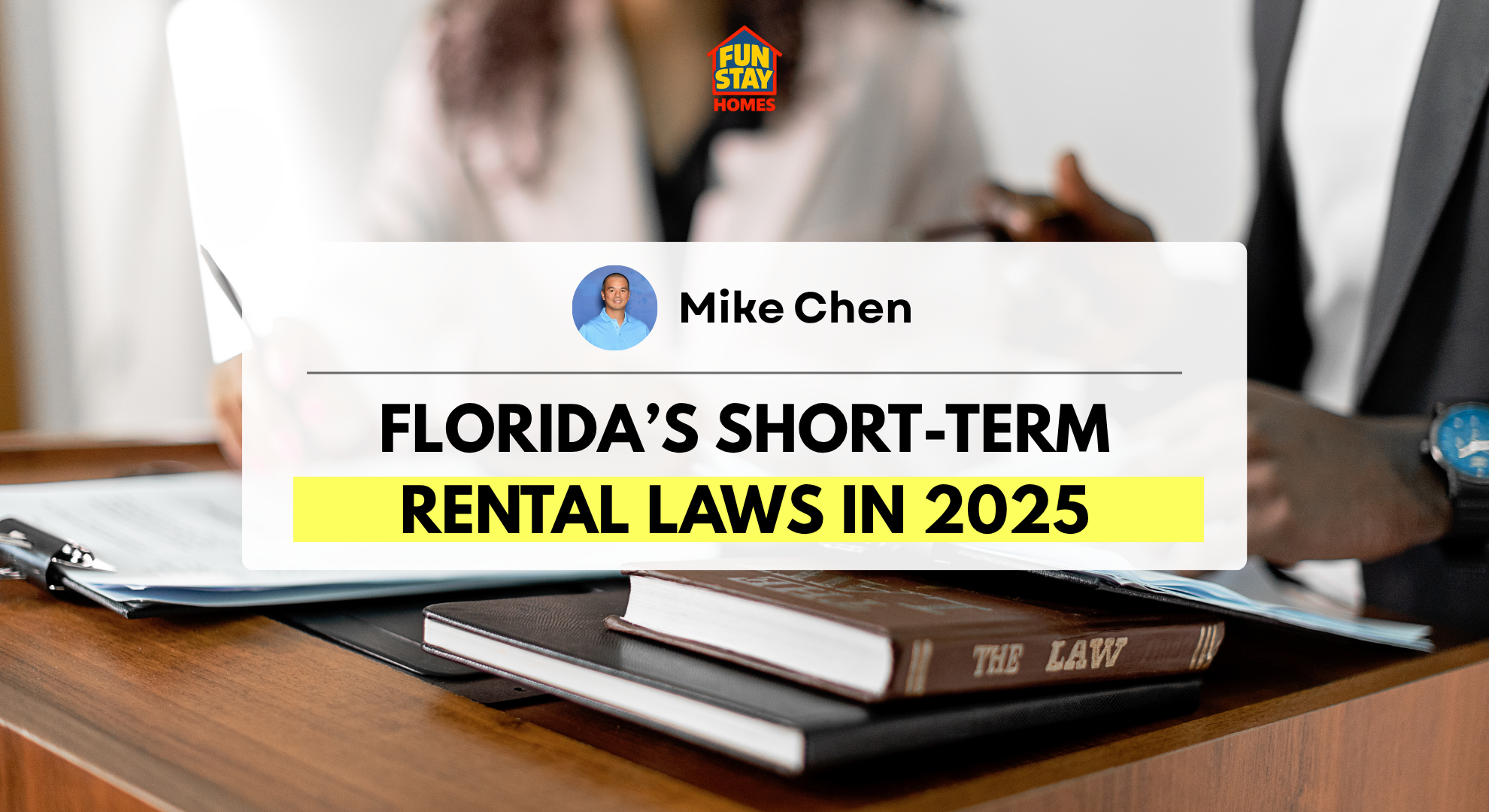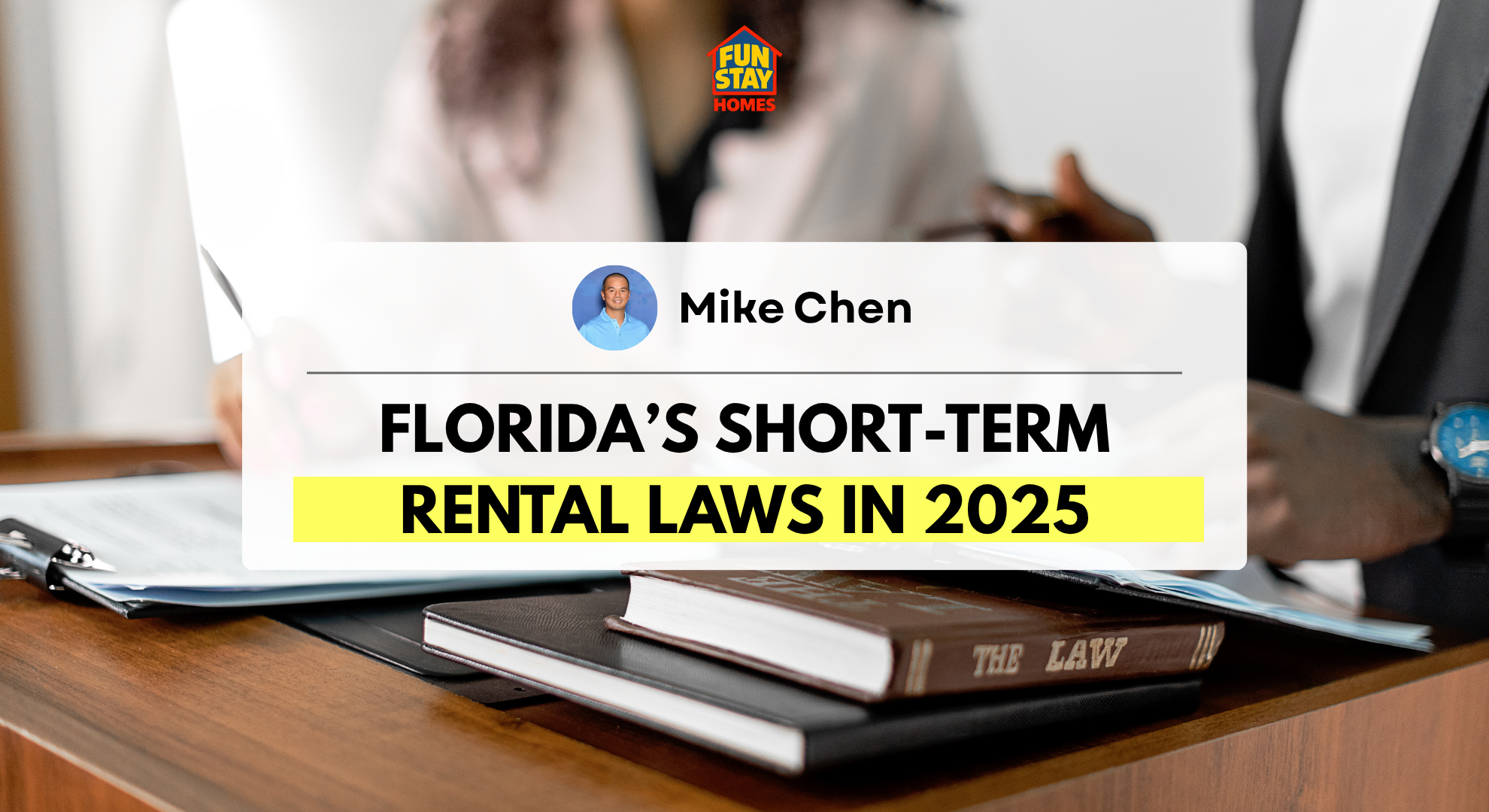
Florida’s vacation rental market is booming, with 143 million visitors recorded in 2024 and revenue projected to reach $24.78B by 2029. However, Florida short-term rental laws 2025 remain a complex mix of state and local rules after the SB280 veto.
This guide helps property owners understand how the 2025 updates affect renting on platforms like Airbnb or Vrbo, what has changed, and how working with a property management company can simplify compliance while keeping hosting profitable and stress-free.

What Counts as a Short-Term Rental in Florida?
Under Florida Statutes, particularly Chapter 509, a property is considered a short-term rental if it:
- Is rented for less than 30 days or one calendar month per stay
- Is rented more than three times per calendar year
- Is primarily used by transient guests rather than long-term tenants
This applies to various property types, including:
- Single-family homes
- Condominiums
- Duplexes, triplexes, and other small multi-unit dwellings (up to four units)
Short-term rentals are classified as public lodging establishments and require a license from the Department of Business and Professional Regulation (DBPR).
While these are statewide rules, each city or county may impose additional permits, zoning restrictions, or occupancy limits. Property owners must comply with both state laws and local ordinances.
Timeshares are excluded.
Timeshares fall under the Florida Vacation Plan and Timesharing Act, which has its own licensing, tax, and usage requirements. Because they operate under shared ownership agreements, timeshares are not treated as vacation rentals under Chapter 509 and do not require a vacation rental license in Florida.
If your property qualifies as a short-term rental, you must register with the DBPR, which issues two types of licenses:
- Vacation Rental Condos – for condo or cooperative units
- Vacation Rental Dwellings – for single-family homes or multi-unit properties (up to four units)
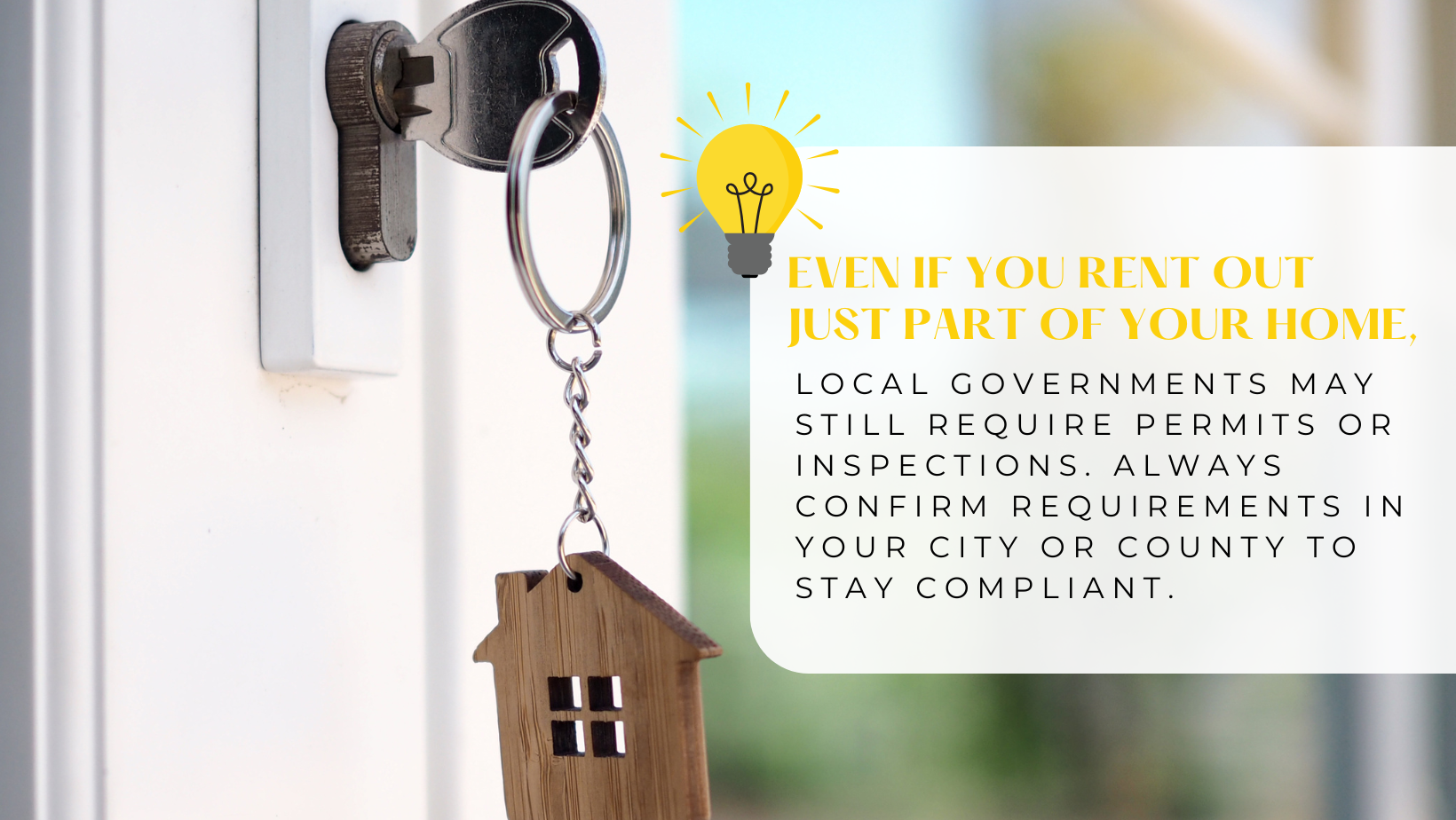
Home-Share Exemption
Florida law makes a distinction for home-sharing arrangements. If you are only renting out a portion of your primary residence while living on-site as the host, the state’s STR definition does not apply.
For example, if you list multiple individual rooms in your home on Airbnb, you may bypass state-level STR licensing requirements.
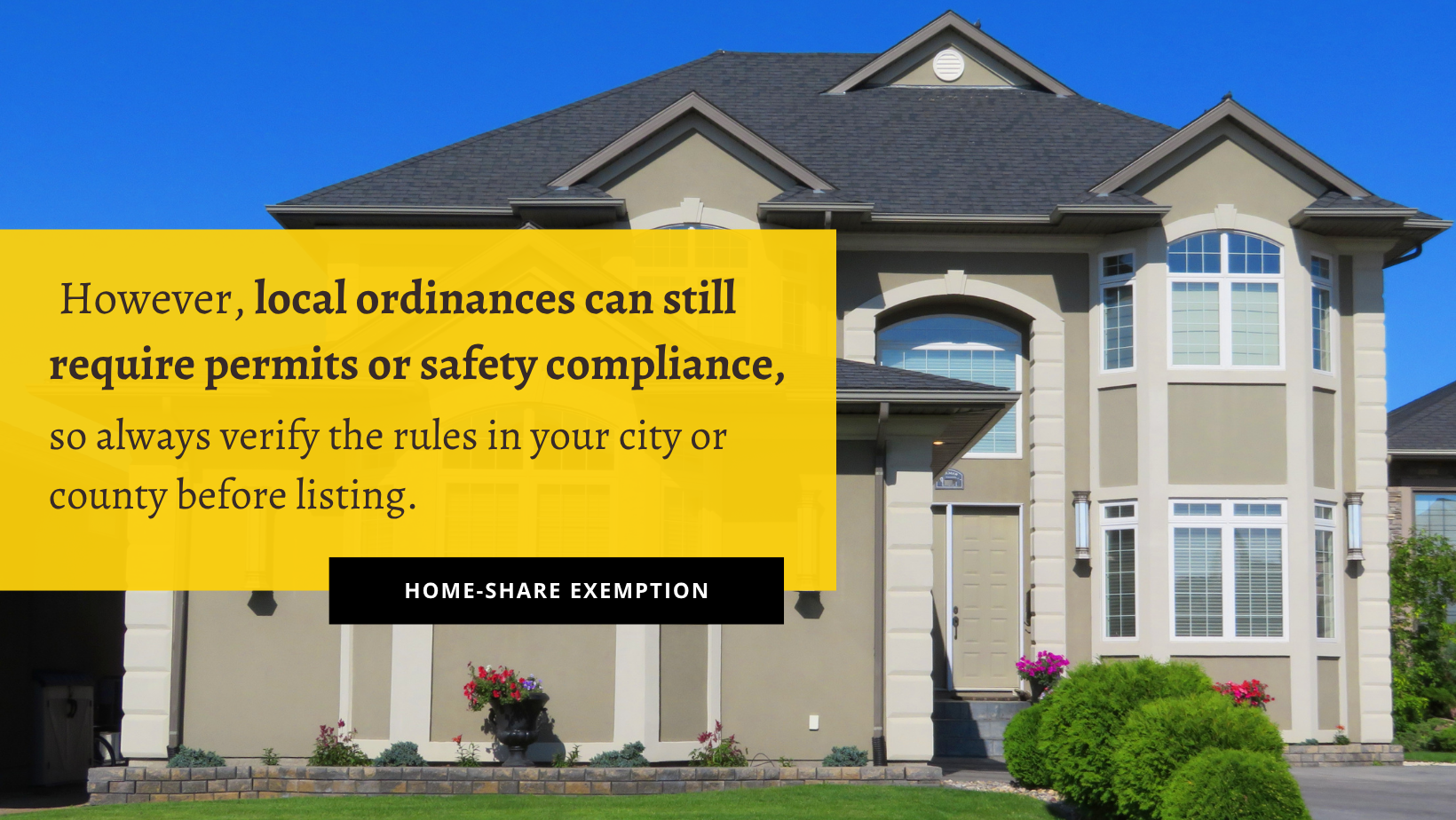
Do I Need a License to Rent Out My Property in Florida?
Yes. Under Florida short-term rental laws 2025, you must obtain a vacation rental license in Florida if you rent your property for less than 30 days per stay and more than three times per year.
This applies whether you list a condo in Orlando for weekend stays, manage multiple townhomes near Disney, or rent out a single-family home in Kissimmee during peak travel seasons.
As long as the property is offered for short-term stays more than three times annually, it must be licensed with the Florida Department of Business and Professional Regulation (DBPR).
Types of DBPR Licenses
The DBPR issues two main license types:
- Vacation Rental Condos – For units within a condominium or cooperative.
- Vacation Rental Dwellings – For single-family homes or multi-unit properties with up to four units.
Licenses can be set up as a single license for one property, a group license for multiple units in the same building, or a collective license that covers several properties under one management entity—ideal for owners with multiple listings.

What You Need to Apply
Owners must provide:
✅ Proof of property ownership
✅ Basic property details (address, unit type, and guest capacity)
✅ A Human Trafficking Awareness Training Certificate (required for staff involved in guest-facing services)
✅ A Balcony Inspection Certificate for properties three stories or taller
Don’t Forget Local Permits
Even with a DBPR license, local governments can require a Business Tax Receipt (BTR), zoning verification, or even a public hearing before granting approval.
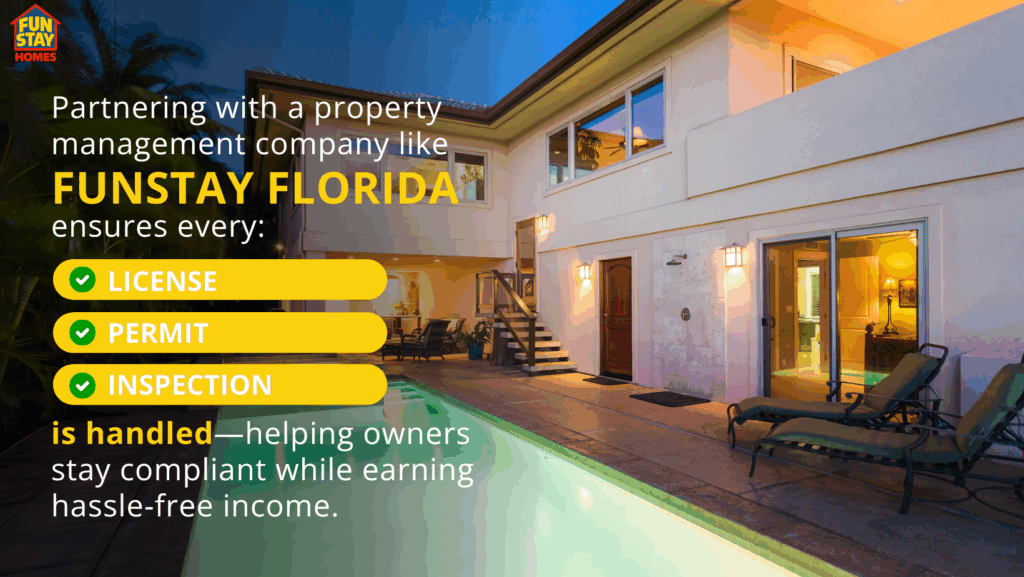
What Are the New Rules for Airbnb in Florida in 2025?
Florida short-term rental laws 2025 introduce several changes that affect Airbnb hosts statewide.
One key update is a new 24-hour cancellation window for bookings made at least seven days in advance, along with a shift from Airbnb’s “Strict” to the more flexible “Firm” cancellation policy.
Another major change is that advertising platforms like Airbnb must now collect and remit state and local taxes, including the 6% state transient rental tax and applicable county surtaxes. The Florida Department of Business and Professional Regulation (DBPR) is also developing a statewide database of licensed vacation rentals, increasing compliance checks.
Although Senate Bill 280 attempted to centralize regulations, it was vetoed in 2024, meaning local governments still control zoning, occupancy caps, and permits. These Florida Airbnb laws vary widely by city:
- Orlando: Only allows home-sharing; entire-home rentals need special approval.
- Miami Beach: STRs are limited to certain districts and require a DBPR license, Business Tax Receipt, and Resort Tax Certificate.
- Destin: Occupancy capped at two guests per bedroom plus four additional people.
- Clearwater: Prohibits STRs under 30 days in most residential zones.
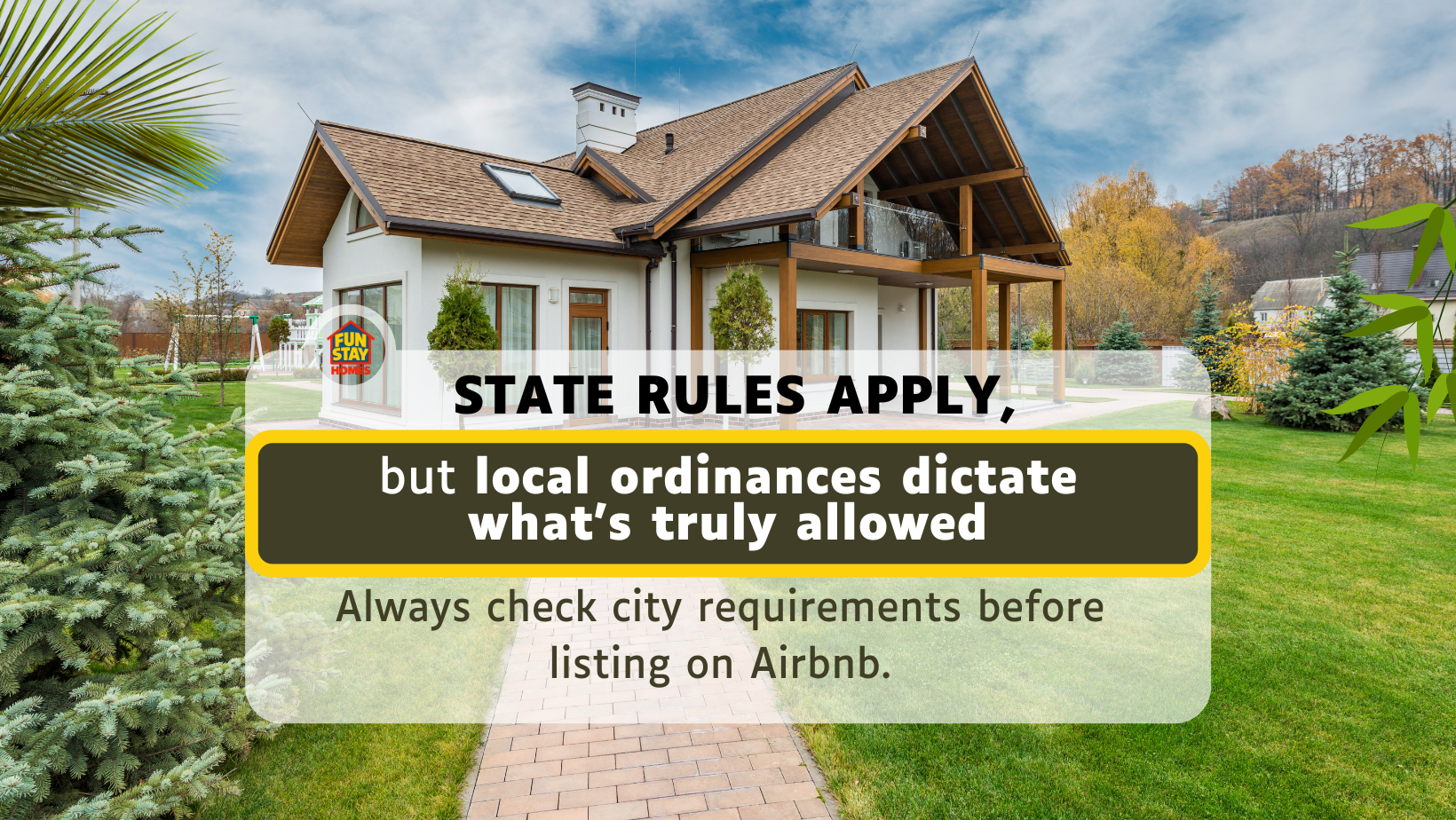
Potential Future Changes
Florida’s short-term rental landscape may shift again in the coming years. Lawmakers could revisit statewide regulation efforts similar to SB280 in 2025–26, aiming to unify rules across the state.
Meanwhile, many local governments are tightening zoning, permit, and occupancy requirements each year. Because these changes can happen quickly, working with an experienced property management company helps owners stay compliant, avoid penalties, and adapt to new regulations without stress.
Taxes, Insurance & Compliance
Operating a short-term rental in Florida isn’t just about having a great listing—it also means staying on top of taxes, insurance, and safety requirements.
State & Local Taxes
Florida short-term rental laws 2025 require hosts to collect and remit several taxes:
- 6% State Sales Tax – applies to all vacation rentals.
- 0.5%–1.5% Discretionary Surtax – varies by county.
- County Tourist Development Tax (Bed Tax) – ranges from 2% to 6%, funding local tourism programs.
Airbnb and Vrbo may collect some state taxes automatically, but hosts remain responsible for local and federal filings.
Federal Taxes and Deductions
If you rent your property for more than 14 days per year, the IRS classifies it as a business. Owners can deduct expenses like:
- Repairs and maintenance
- Utilities and insurance
- Marketing and management fees
- Depreciation through strategies like cost segregation
Keeping accurate records and consulting a tax professional can help maximize savings.
Insurance & Liability
Standard homeowner policies usually do not cover short-term rental activities. Hosts should secure dedicated STR insurance to protect against property damage, guest injuries, or lawsuits. Platforms like Airbnb provide limited protection, so personal coverage is essential.
Safety & Compliance
Florida requires hosts to meet safety standards, including:
- Smoke detectors and fire extinguishers
- Balcony inspections every three years for buildings over three stories
- Proper pool barriers and posted emergency contacts (if applicable)
How a Property Management Company Makes Compliance Easy
Managing a short-term rental in Florida can be overwhelming with licenses, taxes, and strict local rules. Partnering with a professional company like FunStay Homes takes the hassle out of hosting while keeping you compliant and profitable.
FunStay handles every detail that can otherwise lead to fines or permit issues, including DBPR licensing, Business Tax Receipt renewals, inspections, and tourist tax reporting.
What FunStay Does for You:
- Listing optimization across Airbnb, Vrbo, and other platforms to boost visibility and bookings.
- Dynamic pricing strategies that adjust nightly rates based on demand and seasonality.
- Guest screening, check-ins, and 24/7 support to ensure five-star stays and fewer disputes.
- Full compliance support, including license applications, BTR renewals, tax collection setup, and safety inspections.
- Maintenance and cleaning coordination so your home stays guest-ready year-round.
With a local Superhost-led team, FunStay also helps owners avoid HOA conflicts, zoning mistakes, and costly fines, making short-term rental ownership truly stress-free.
Frequently Asked Questions
What classifies a property as a short-term rental?
A short-term rental is any property rented for less than 30 days, more than three times a year. This definition covers single-family homes, condos, and multi-unit dwellings like duplexes. If you meet these criteria, you likely need a DBPR license.
Do I need a license for Airbnb rentals?
Yes, most likely. If you rent your entire property frequently for short stays, Florida law requires a DBPR vacation rental license. This applies regardless of the platform you use, whether it’s Airbnb, Vrbo, or your own booking site.
Does the home-share exemption apply to me?
It applies if you only rent a single room or portion of your home while living there during the guest’s stay. If you meet this specific “hosted” criteria, you may be exempt from obtaining a full state vacation rental license.
What are the new 2025 Airbnb rules?
Key updates include a stricter cancellation policy window and mandatory tax collection by platforms like Airbnb. Additionally, while SB280 was vetoed, local governments still hold significant power over zoning and occupancy, so staying compliant locally is more critical than ever.
How do I manage local taxes and permits?
Beyond state taxes, you often need a county Business Tax Receipt and must pay Tourist Development Taxes. While platforms collect some taxes, hosts are ultimately responsible for ensuring full compliance with all local and county-level tax obligatio
Can I rent out my condo on Airbnb?
Only if your condo association rules allow it. Even with a state license, you must adhere to your HOA’s specific bylaws regarding short-term rentals. Always check your condo documents before listing to avoid fines or legal issues.
How can property management help with compliance?
A full-service manager like FunStay handles the heavy lifting of licensing, tax remittance, and inspections. We ensure your property meets all state and local regulations, protecting you from fines while maximizing your rental income through expert management.

